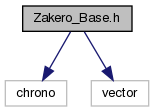Zakero Base. More...

Go to the source code of this file.
Macros | |
| #define | ZAKERO_CONCAT(thing_1_, thing_2_) |
| Concatenate the two things. More... | |
| #define | ZAKERO_MACRO_HAS_VALUE(define_) |
| Check if a macro has a value. More... | |
| #define | ZAKERO_STEADY_TIME_NOW(unit_) |
| Get the current time. More... | |
| #define | ZAKERO_SYSTEM_TIME_NOW(unit_) |
| Get the current time. More... | |
Enumerations | |
| enum | zakero::Storage : uint64_t { zakero::Storage::Byte, zakero::Storage::Kilobyte, zakero::Storage::Megabyte, zakero::Storage::Gigabyte, zakero::Storage::Terabyte, zakero::Storage::Petabyte, zakero::Storage::Exabyte } |
| Conversion Type. More... | |
Functions | |
| double | zakero::convert (const double size, const zakero::Storage from, const zakero::Storage to) noexcept |
| Convert storage sizes. More... | |
| uint64_t | zakero::convert (const uint64_t size, const zakero::Storage from, const zakero::Storage to) noexcept |
| Convert storage sizes. More... | |
| std::string | zakero::to_string (const std::error_code &error) noexcept |
| Convert an std::error_code to a std::string. More... | |
| template<class Type > | |
| bool | zakero::vectorContains (const std::vector< Type > &vector, const Type &value) noexcept |
| Check the contents of a std::vector. More... | |
| template<class InputIter , class Type > | |
| bool | zakero::vectorContains (InputIter first, InputIter last, const Type &value) noexcept |
| Check the contents of a std::vector. More... | |
| template<class Type > | |
| auto | zakero::vectorErase (std::vector< Type > &vector, const Type &value) noexcept |
| Erase the contents of a std::vector. More... | |
Detailed Description
Nothing complicated here, just a collection of helper functions, macros, and templates that may be useful in your projects.
Include this header in your source code to use these features.
- Version
0.9.1
- Added macro ZAKERO_STEADY_TIME_NOW()
- Added macro ZAKERO_SYSTEM_TIME_NOW()
- Added vectorErase()
0.9.0
- The initial collection
- Copyright
- Mozilla Public License v2
Macro Definition Documentation
◆ ZAKERO_CONCAT
| #define ZAKERO_CONCAT | ( | thing_1_, | |
| thing_2_ | |||
| ) |
Use the C/C++ Preprocessor to create a new symbol name. For example the symbol abcxyz could be created using ZAKERO_CONCAT(abc, xyz).
- Example
- int foobar = 1;ZAKERO_CONCAT(foo, bar)++; // foobar == 2int ZAKERO_CONCAT(magic_, 42) = 123;// int magic_42 = 123;
- Parameters
-
thing_1_ Symbol left side thing_2_ Symbol right side
◆ ZAKERO_MACRO_HAS_VALUE
| #define ZAKERO_MACRO_HAS_VALUE | ( | define_ | ) |
Use this macro function to determine if a macro has a value and is not just defined.
- Example
- #define BEER#if ZAKERO_MACRO_HAS_VALUE(BEER)#warning I can has beer!#else#error No beer! // <-- This happens#endif
- Parameters
-
define_ The defined macro to check.
◆ ZAKERO_STEADY_TIME_NOW
| #define ZAKERO_STEADY_TIME_NOW | ( | unit_ | ) |
This macro will get the current time count of the std::chrono::steady_clock.
- Note
- The
std::chronois automatically applied to theunit_.
- Example
- auto time_now = ZAKERO_STEADY_TIME_NOW(milliseconds);
- Parameters
-
unit_ The time unit to get.
◆ ZAKERO_SYSTEM_TIME_NOW
| #define ZAKERO_SYSTEM_TIME_NOW | ( | unit_ | ) |
This macro will get the current time count of the std::chrono::system_clock.
- Note
- The
std::chronois automatically applied to theunit_.
- Example
- auto time_now = ZAKERO_SYSTEM_TIME_NOW(milliseconds);
- Parameters
-
unit_ The time unit to get.
Enumeration Type Documentation
◆ Storage
|
strong |
Sizes in powers of 2.
Function Documentation
◆ convert() [1/2]
|
inlinenoexcept |
Conversion from one storage unit to another is handled by this method. These storage units are in powers of 2.
The difference between this method and zakero::convert(const uint64_t, const zakero::Storage, const zakero::Storage) is that conversions to a larger unit will be a fraction.
- Example
- , zakero::Storage::Gigabyte, zakero::Storage::Byte);, zakero::Storage::Kilobyte, zakero::Storage::Megabyte);
- Returns
- The converted value.
- Parameters
-
size The size to convert from The source unit to The destination unit
◆ convert() [2/2]
|
inlinenoexcept |
Conversion from one storage unit to another is handled by this method. These storage units are in powers of 2.
Converting to a larger size is rounded down and may result in 0 if the from size is not large enough.
- Example
- uint64_t bytes = zakero::convert(uint64_t(16), zakero::Storage::Gigabyte, zakero::Storage::Byte);uint64_t megs = zakero::convert(uint64_t(16), zakero::Storage::Kilobyte, zakero::Storage::Megabyte);// megs == 0
- Returns
- The converted value.
- Parameters
-
size The size to convert from The source unit to The destination unit
◆ to_string()
|
noexcept |
The provided error will be converted to a string.
- Returns
- A string
- Parameters
-
error The value
◆ vectorContains() [1/2]
|
inlinenoexcept |
A convience method to make searching a vector easier, like std::map::contains().
- Example
- Return values
-
true The valuewas found.false The valuewas not found.
- Parameters
-
vector The vector to search value The value to look for
◆ vectorContains() [2/2]
|
inlinenoexcept |
A convience method to make searching a vector easier. While this method does not save that many keystrokes, it does lead to more readable code.
- Example
- std::vector<int> v = { 0, 1, 2, 3 };if(vectorContains(std::begin(v), std::end(v), 1){// Found it}// Compare with the "long" form, the// value that is searhed for gets lost// very easily.if(std::find(std::begin(v), std::end(v), 1) != std::end(v)){// Found it}
- Return values
-
true The valuewas found.false The valuewas not found.
- Parameters
-
first Start searching here last Stop seaching here value The value to look for
◆ vectorErase()
|
inlinenoexcept |
A convience method to make removing content from a vector easier.
- Example
- Return values
-
true The valuewas found.false The valuewas not found.
- Parameters
-
vector The vector to search value The value to look for